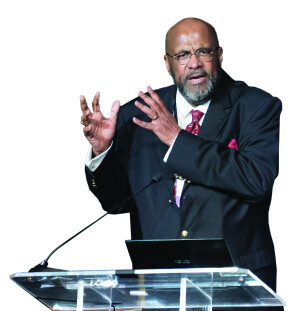McMickle calls on BWC to stop ignoring poverty

Rev. Marvin McMickle, President and Director of the Doctor of Ministry Program and professor of African American Religious Studies for Colgate Rochester Crozer Divinity School, led Annual Conference’s two-day Bible study on Luke 16:19-22.
McMickle called attention to the contrast between the rich man in his fine linen who ate sumptuously and Lazarus, the beggar covered in sores at the rich man’s gate. The rich man could not come and go without seeing this man in poverty but did not help him. After they both died, Lazarus woke in the bosom of Abraham in heaven, while the rich man went to hell.
His focus turned to thinking about the poverty we see today, on our way to church, dressed in our fine linens, and the poverty we drive past on our way to brunch to eat sumptuously after church. “It is no longer possible for someone to say, ‘Well, I did not know’ about the suffering of the poor. Poverty has a visibility today that it did not have in the past. The faces of the poor must now be confronted,” he said.
McMickle shared statistics that the United States ranks second out of 35 developed countries on the scale of what economists call “relative child poverty,” with 23.1 percent of its children living in poverty. Only Romania ranked higher. And, he said, we have such a problem because we tolerate a steadily expanding gap. He said, “the church is an island of prosperity surrounded by a sea of great poverty.”
The poor man goes to heaven and the rich man to hell. Why, McMickle asked. “He paid no attention to the poor man just outside his door.”
“Luke 16 is a challenge to you to go home to your home church, look outside your window and see who or what is there.”
Reflecting on the harbor of Baltimore, McMickle said, "If you walk around the downdown area, you get one perception of Baltimore. You see yachts and boats and manifestations of prosperity and wealth. But go a mile from here. Go less than a mile from here, and what you will see is Luke 16."
It’s not about the issue of poverty versus prosperity; it’s the proximity of one to another, he said. “Whether or not we end up in hell depends on the degree to which we have engaged with the poverty that impacts us.”
McMickle laid out four things that can be done to address the issue of poverty.
- Have a biblical vision of the future; imagine a future different from the ruling elite;
- Allow your values to inform your behavior. From Micah 6:8, we know what is good: do justice, love kindness and be humbly obedient to God.
- Use your voice to speak up and advocate for policies and practices on behalf of economic justice; be a voice for the voiceless.
- Vote to elect people who will legislate for JUSTICE and not for JUST US.
Both days, McMickle acknowledged the division that the denomination is experiencing over issues of human sexuality. Poverty is our challenge, he said. "I’m not saying it’s the only one. Wherever you come out on issues of human sexuality, just know the rest of us are having the same debate as you are. But whatever you end up with on that issue, this one (poverty) will still be here."
McMickle also called attention to Matthew 10:3-4. Jesus began his ministry calling everyday, amiable fishermen, a “Galilean mafia,” McMickle said. But then he tossed in Matthew the tax collector, and Simon the Zealot.
Zealots, he explained, hated tax collectors. The pair were natural enemies, but both followed Jesus and were able to co-exist in the same circle. “I can’t think of any two unlikely people to be near Jesus,” he said.
“Some of you may be Matthew the tax collector. Some of you might be Simon the Zealot,” McMickle said.
Learn from your predecessors, he said. The one thing you have in common is that Christ called you to “come and follow me.”

